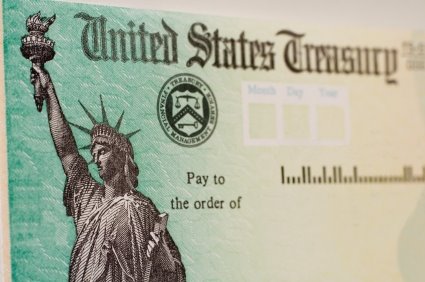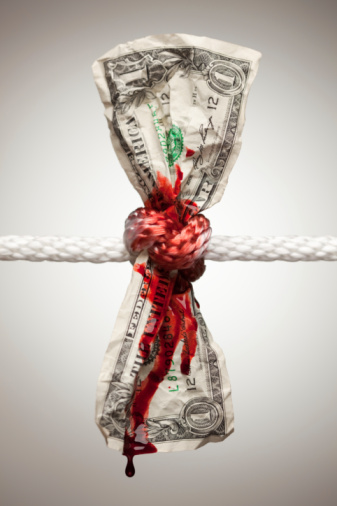Debtors Prisons in the U.S.?
Debtors’ Prisons are back in the U.S. of A.
As States search for ways to increase revenues, they have been using their weapon of mass destruction – their prison system – to bludgeon those unable to pay fines and tickets in to coughing up some cash. And it’s not limited to government agencies. Owe money on a medical bill, payday loan, or to a collection agency? You may well find yourself in jail.
While it sounds like something out of a Dickens novel that could never happen in the America which Obama claims is a shining beacon to the world, debtors prisons are back in a big way. More than a third of all States now allow borrowers who don’t pay their bills to be jailed, even when debtors’ prisons have been explicitly banned by State constitutions and Federal law. A report by the American Civil Liberties Union found that people were imprisoned even when the cost of doing so exceeded the amount of debt they owed. Stories of surprise arrests for unpaid debt have been reported in Indiana, Missouri, Tennessee and Washington.

Want a few examples? According to NPR, Robin Sanders of Illinois was stopped for having a loud muffler. But, rather than a ticket or warning, she was taken to jail for failure to appear in court. What was the charge? Failure to pay a $730 medical bill.
According to the Wall Street Journal, Sean Matthews, a homeless New Orleans construction worker, was incarcerated for five months for a $498 debt. While it cost the State $3,000 to hold and feed him, the creditor eventually got his money.
Following the lead of civil creditors, cities and towns are getting in on the act. The New York Times reported on the story of Gina Ray, who was jailed three times in Alabama for her inability to pay a $179 speeding ticket. By the time it was all said and done, the town and the collection agency had levied fines totaling $3,170 and she spent 40 days in jail. Adding insult to injury, a fee was charged by the government for each day she was incarcerated.
Then there is the case of the Illinois breast cancer survivor Lisa Lindsay. “She got a $280 medical bill in error and was told she didn’t have to pay it,” The Associated Press reports. “But the bill was turned over to a collection agency, and eventually State troopers showed up at her home and took her to jail in handcuffs.”
OK, hold on, you might say. This sounds ridiculous. If you fail to show up for civil court, the creditor simply gets a default judgment, right? Well, creditors have figured out a loophole that allows them to put you in jail until you pay-up.
Here’s how clever payday lenders work the system in Missouri — where, it should be noted, jailing someone for unpaid debts is illegal under the state constitution.
First, explains St. Louis Post-Dispatch, the creditor gets a judgment in civil court that a debtor hasn’t paid a sum that he owes. Then, the debtor is summoned to court for an “examination,” which is a review of their financial assets.
If the debtor fails to show up for the examination — as often happens in such cases — the creditor can ask for a “body attachment” — essentially, a warrant for the debtor’s arrest. At that point, the police can haul the debtor in and jail them until there’s a court hearing, or until they pay the bond. No coincidence, the bond is usually set at the amount of the original debt.
As the Dispatch notes:
“Debtors are sometimes summoned to court repeatedly, increasing chances that they’ll miss a date and be arrested. Critics note that judges often set the debtor’s release bond at the amount of the debt and turn the bond money over to the creditor — essentially turning publicly financed police and court employees into private debt collectors for predatory lenders.”
So, borrowers aren’t arrested for nonpayment, but rather for failing to respond to court hearings, pay legal fines, or otherwise showing “contempt of court” in connection with a creditor lawsuit…but the result is the same. Borrowers are in prison, sometimes for long periods, because they were unable to pay a debt.
Debtors’ prisons have a long and violent history in America, going back at least to the 1750s, and were abolished by Federal law and most States in 1883. They were the source of Shay’s Rebellion, where debtors’ prisons were emptied and a full scale revolt ensued in Massachusetts from 1786 to 1787. The uprising was eventually crushed after the State raised a private army, with creditors’ rights and debtors’ prisons being restored.
History and the constitution aside, there is big money to be made.For example, the State of Alabama charges a 30 percent collection fee for assisting creditors, while Florida allows private debt collectors to add a 40 percent surcharge on the original debt. “Many states are imposing new and often onerous ‘user fees’ on individuals with criminal convictions,” the authors of the Brennan Center report wrote. “Yet far from being easy money, these fees impose severe — and often hidden — costs on communities, taxpayers, and indigent people convicted of crimes. They create new paths to prison for those unable to pay their debts and make it harder to find employment and housing as well to meet child-support obligations.”
According to the ACLU: “The sad truth is that debtors’ prisons are flourishing today, more than two decades after the Supreme Court prohibited imprisoning those who are too poor to pay their legal debts. In this era of shrinking budgets, state and local governments have turned aggressively to using the threat and reality of imprisonment to squeeze revenue out of the poorest defendants who appear in their courts.”
It is outrageous to think that, in our enlightened society, which is a shining example of freedom and justice to the world, that creditors are manipulating the courts to extract whatever they can from people who can least afford to pay.
It is even more disheartening that courts are enabling and encouraging this practice in an attempt to prop up their fledgling budgets.












Leave a Reply
Want to join the discussion?Feel free to contribute!